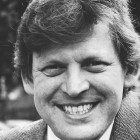Thomas Allen Suggest updates
Sir Thomas Allen.
Born Seaham, Co. Durham, 10 September 1944.
English baritone and director.
Studies
Royal College of Music 1964-68, with Hervey Alan. He also studied the organ.
Performances of opera
Sir Thomas Allen has had one of the most distinguished international careers of any singer of British origin in the years since the war.
Allen has from the beginning been a subtle and fascinating actor, with an unusual ability to use the words in whichever language he was singing. His warm and flexible baritone has always seemed ideal for the lyrical works of Mozart and Britten, but he has also had great success in Monteverdi and in some works by Tchaikovsky and Prokofiev. Fortunately he had the sense to avoid the heavier baritone roles in the German and Italian repertoires. The only major Wagner parts he risked were the pure lyricism of Wolfram in Tannhäuser and the superb character role of Beckmesser in Die Meistersinger. In Verdi he performed wonderfully as Ford, Posa and Germont, while avoiding roles such as Rigoletto, Luna or Iago which might have risked damage to his voice.
After leaving college, Allen spent the 1969 season in the chorus at Glyndebourne, and then joined Welsh National Opera as a principal, making his début as Marchese d'Obigny in La traviata. He quickly added parts such as Moralès, Figaro in The Barber of Seville, Papageno, Guglielmo, Schaunard, Paolo Albiani (Simon Boccanegra), and Falke (Die Fledermaus). This period culminated in 1972 in a memorable production of Billy Budd in which he played the title role. In later years he returned to the company to try out such major roles as Eugene Onegin and Posa (Don Carlos 1978). These were all parts he would later perform regularly with the world’s major opera houses.
Covent Garden
His début at Covent Garden came in 1971 and for several seasons he added a number of smaller parts such as Donald (Billy Budd), Dominik (Arabella), Silvio (Pagliacci), Ned Keene (Peter Grimes), Marullo (Rigoletto), Schaunard (La Bohème), and Melot (Tristan und Isolde). He soon graduated to performances of the major roles by Mozart and Britten, as well as Rossini’s Figaro, Gounod’s Valentin and Donizetti’s Belcore.
Summer Festivals
At the Aldeburgh Festival of 1974 Allen created the leading role of Count Marco Valerio in The Voice of Ariadne (Musgrave). At Glyndebourne he also sang parts such as the Forester (Cunning Little Vixen) and his first Don Giovanni, in the Peter Hall staging (1977). He rarely worked at the Coliseum, but when he did visit ENO it was for notable events such as the title role in Busoni’s Doktor Faust or Andrei Bolkonsky in Prokofiev’s War and Peace. One very special production he appeared in came at the second Buxton Festival of 1980, when he gave a performance that resurrected the hitherto neglected Hamlet by Ambroise Thomas. His career rapidly developed to include regular performances in the world’s most important houses, including La Scala, Vienna, Munich and the Met.
Scotland
Sadly Allen's operatic appearances in Scotland have been rare. He only sang three roles with Scottish Opera. The first came at the 1978 Edinburgh Festival, when he sang beautifully as Pelléas in a revival of the great Colin Graham staging. He returned in 1981 to play Macheath in The Beggar’s Opera, which opened at the Festival before touring extensively. The arrangement used may have attempted to expand the piece beyond its natural limits, but Allen’s performance was highly distinguished.
There was then an enormous gap before he returned to the stage as Music Master (Ariadne auf Naxos) in 2018.
Allen also gave a lively performance in the opening concert of the 2007 Festival, as Pangloss in Bernstein’s Candide.
Otherwise we have had to be content with concert works such as Sea Drift by Delius (1980), the premiere of Arthur Oldham’s Psalms in Time of War (1977), and the Brahms Requiem (1990). Allen has also given some wonderful recitals, performing works by Schumann, Vaughan Williams and Copland.
His later career as a director and consultant with Scottish Opera brought him to Scotland more often. He chose to work on pieces he knew thoroughly from the inside, logically following his production of The Barber of Seville (2007) with The Marriage of Figaro (2010), before tackling The Magic Flute (2012) and Don Giovanni (2013).
Recordings
He has appeared on a large number of recordings of songs and concert pieces as well as operas. Even better for his fans, some of his most famous roles, such as Billy Budd and Don Giovanni, can be seen on DVD. His audio recordings of opera also include Valentin in Faust, Claudio in Béatrice et Bénédict and Oreste in Iphigénie en Tauride.
Roles in Scotland
- Pelléas Golaud’s half-brother
-
Pelléas and Mélisande 1978
- Baritone
-
Sea Drift 1980
- Macheath a highwayman
-
Beggar's Opera 1981
- Baritone
-
German Requiem 1990
- Director
-
Barbiere di Siviglia 2007
Nozze di Figaro 2010
Barbiere di Siviglia 2011
Zauberflöte 2012
Don Giovanni 2013
Nozze di Figaro 2016
Nozze di Figaro 2017
Zauberflöte 2019
Soldier's Tale 2021
Don Giovanni 2022
Barbiere di Siviglia 2023
Nozze di Figaro 2026
- Voltaire
-
Candide 2007
- Pangloss
-
Candide 2007
- Narrator
-
Candide 2007
- Martin
-
Candide 2007
- Baritone
-
Sea Symphony 2009
- Music Master
-
Ariadne on Naxos 2018
- Narrator
-
Soldier's Tale 2021
